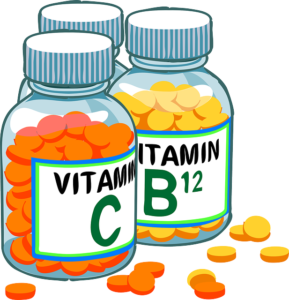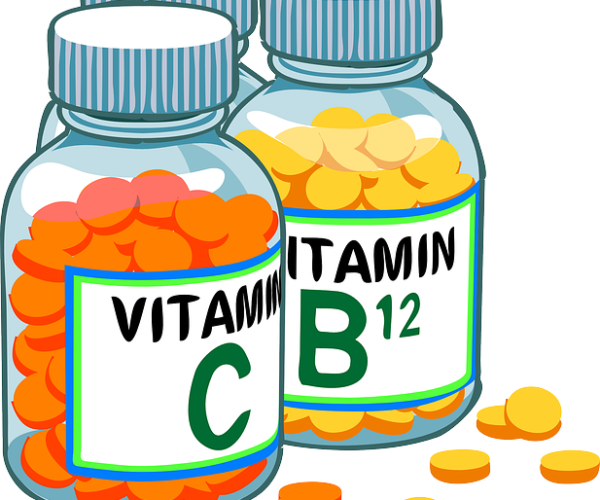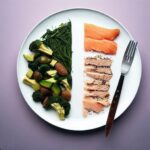Maintaining a robust immune system is crucial to one’s overall health. A robust immune system protects against infections and diseases, keeping us healthy and physically active.
While many factors, including exercise, sleep, and stress management, contribute to a robust immune system, nutrition also plays an important role.
Including natural supplements in your diet is one method to strengthen your immune system through nutrition. These supplements can provide additional nutrients and antioxidants, which may assist in boosting immunity and enhancing overall health.
This article examines the best natural supplements for a robust immune system and their potential benefits.
Vitamin C
 Vitamin C is one of the most well-known and widely used vitamins for immune health maintenance. It has been exhaustively studied over the years, and numerous benefits beyond boosting immunity have been discovered.
Vitamin C is one of the most well-known and widely used vitamins for immune health maintenance. It has been exhaustively studied over the years, and numerous benefits beyond boosting immunity have been discovered.
One of these advantages is the ability to enhance skin health. Vitamin C plays a crucial role in collagen synthesis, which is essential for maintaining the appearance of youthful skin. The skin’s structure and elasticity are provided by collagen, which our bodies produce less of as we age. This can result in wrinkles, fine lines, and skin sagging.
Incorporating vitamin C into your diet can aid in collagen production and preserve your skin’s elasticity and radiance. There are numerous methods to increase the amount of vitamin C in your daily diet. One simple method is to consume citrus fruits such as oranges and grapefruits. There are also kiwis, strawberries, broccoli, bell peppers, and spinach available.
If you have difficulty obtaining enough from food alone, you can also take supplements. Simply avoid exceeding the recommended daily dosage, as excessive vitamin C can cause digestive issues and other adverse effects.
Vitamin D
As discussed, maintaining a robust immune system is essential for overall health and well-being. Vitamin D is a natural supplement that has been demonstrated to have significant benefits in this area.
Studies have shown that individuals with insufficient vitamin D levels are more susceptible to infection and illness.
So why exactly is Vitamin D so essential? First and foremost, it is essential to the health of our immune cells. It regulates their response to pathogens, ensuring that they are able to effectively combat any invading viruses or bacteria. In addition, research indicates that adequate Vitamin D levels may reduce the risk of chronic diseases such as cancer and cardiovascular disease.
Despite the fact that some foods (such as fatty fish and egg yolks) contain trace quantities of Vitamin D, many individuals find it difficult to obtain enough through diet alone. This is where supplementation comes into play; consuming a daily dose of high-quality Vitamin D can help you meet your body’s requirements. Before beginning a new supplement regimen, it is always advisable to consult with a healthcare professional.
Including an abundance of Vitamin D-rich foods in your diet is still an excellent method to naturally support your immune system. Salmon, cod liver oil, mushrooms (when exposed to sunlight), fortified dairy products, and beef liver are all excellent options.
You will be well on your way to optimal immune function if you combine these dietary modifications with consistent supplementation!
Zinc
Zinc, an additional essential mineral for the health of the immune system, plays a crucial function in the body’s defence against pathogens.
Zinc, like Vitamin D, is involved in multiple physiological processes, such as cell growth and division, wound healing, and protein synthesis.
This mineral has been shown to aid in the production of white blood cells, which are responsible for fending off infections.
The ability of zinc supplementation to reduce the duration and severity of common colds is one of its most significant benefits.
According to research, consuming Zinc supplements within 24 hours of experiencing symptoms can shorten the duration of an illness by as much as 33 percent.
In addition, regular Zinc consumption may boost immunity in older individuals who are susceptible to infection due to age-related decline.
Although there are numerous Zinc supplements on the market today, it is always preferable to obtain nutrients from whole foods whenever feasible.
Oysters, beef, pork, chicken, legumes like chickpeas and lentils, nuts like pistachios and almonds, fortified cereals, and dairy products like cheese and milk are excellent sources of zinc.
Including these foods in your diet can meet your daily nutritional needs without the need for supplements, unless your healthcare provider advises otherwise.
Echinacea
As the winter months approach, the infamous cold and flu season also approaches. Someone appears to be sniffling or wheezing at every turn. But have no concern, because echinacea may be your secret weapon against illness.
Echinacea has been used as a natural remedy for colds and other respiratory infections for centuries. Including flavonoids and alkamides, the plant contains a number of active compounds with immune-enhancing properties. Together, these compounds stimulate the immune system, making it more effective against infection.
Echinacea is available in various forms, including capsules, beverages, tinctures, and extracts. Despite the fact that all forms can provide some benefit, studies indicate that standardised extracts are typically the most effective.
Consider a high-quality extract supplement if you wish to incorporate echinacea into your daily regimen for maximum protection against colds and flus this season.
Elderberry
Elderberry is a popular immune-boosting natural supplement that has been used for centuries. This small, dark berry is loaded with antioxidants and minerals that can aid in disease prevention and overall health promotion.
Elderberry syrup’s ability to reduce cold and flu symptoms is one of its most well-known benefits. Taking elderberry supplements can abbreviate the duration of these illnesses by up to four days, according to studies. Elderberry also contains anti-inflammatory compounds that can alleviate respiratory infection-related pain and distress.
In addition to its medicinal properties, elderberry is also a tasty tea. There are numerous online recipes for elderberry tea, which can be sweetened with honey or other all-natural sweeteners.
Regular consumption of elderberry tea may provide additional health benefits, including enhanced digestion and decreased inflammation throughout the body.
Garlic
While elderberry is an excellent natural immune system booster, there are other options that can be equally effective.
Garlic is one of these supplements. Yes, the same ingredient that gives your food an extra flavour and gives you garlic breath also has surprising health benefits.
Garlic contains compounds such as allicin that have been shown to increase the production of white blood cells, allowing the body to combat infections more quickly.
Garlic’s anti-inflammatory properties can help reduce inflammation in the body and reduce the risk of chronic diseases like heart disease and cancer.
If you want to incorporate more garlic into your diet, try roasting vegetables with it or incorporating it into salad condiments.
You can even sauté garlic in olive oil and use it as a broth or stew base. Try making homemade pickled garlic for a unique take on this potent superfood, if you’re feeling adventurous.
With so many delectable options, there is no reason not to begin reaping the benefits of garlic supplementation immediately.
Probiotics
Probiotics are live microorganisms that, when ingested in sufficient quantities, can provide numerous health benefits. They are commonly referred to as ‘healthy bacteria’ and are naturally present in fermented foods such as yoghurt, kefir, sauerkraut, and kimchi.
These beneficial bacteria colonise the intestine and support a healthy microbial balance. The benefits of probiotics for digestive health include reducing inflammation, improving digestion, and strengthening the intestinal barrier, according to research.
This is especially essential for those with weakened immune systems or gastrointestinal issues, such as irritable bowel syndrome (IBS) or inflammatory bowel disease (IBD). Regular consumption of probiotics can also enhance immunity by increasing antibody production and enhancing white blood cell activity.
There are a variety of probiotics available on the market today, each with its own properties and immune system effects. Lactobacillus strains are among the most frequently used probiotics and have been shown to boost resistance to respiratory infections.
Bifidobacterium strains are well-known for their ability to reduce inflammation in the digestive tract. Other less well-known strains, such as Saccharomyces boulardii, have been investigated for their potential to prevent antibiotic- or chemotherapy-induced diarrhoea.
Incorporating probiotics into your daily routine can have significant positive effects on both your digestive health and immune function. For optimal results, it is essential to choose high-quality supplements or routinely consume natural sources while maintaining a balanced diet rich in fibre and prebiotic foods.
Can excessive consumption of these dietary supplements harm the immune system?
As with a double-edged sword, consuming excessive amounts of the best natural supplements for a healthy immune system may compromise the body’s defences.
Overdosing on these dietary supplements may result in toxicity and other health complications that may weaken your immunity rather than improve it.
Our immune system has a remarkable capacity to adapt and develop tolerance over time.
As medical or health writers, we must remind individuals to take these supplements moderately as part of a well-balanced diet and lifestyle, so as not to jeopardise their overall health.
Are there any adverse effects associated with the use of these supplements?
Immune system health can be maintained through the use of immune-boosting supplements. It is essential to note, however, that these supplements may cause adverse effects.
Certain individuals may experience allergic reactions or negative drug interactions. Additionally, plant-based supplements are recommended over lab-made alternatives because they have fewer side effects and are generally regarded as safer and more effective at bolstering the body’s natural defences.
Before commencing any supplement regimen, you should always consult a healthcare professional.
Should These Supplements Be Taken Individually Or Together?
It is essential to consider the advantages and disadvantages of combining supplements.
While taking multiple supplements may seem like a quick fix for improved overall health, it is important to be aware that certain ingredients can interact negatively or even cancel each other out.
Before concurrent use of any dietary supplement combination, it is always recommended to consult with a healthcare professional.
Additionally, dosages must be closely monitored because many supplements contain vitamins and minerals that overlap.
By adhering to recommended dosages and consulting a physician, it is possible to safely combine supplements for maximum benefits without risking adverse side effects.
How long does it take these supplements to begin affecting the immune system?
It is essential to note that the duration of effectiveness of natural immune-boosting supplements varies from person to person.
Some people may observe a difference in their health within a few days, while others may not perceive any changes for several weeks.
The recommended dosage will also depend on variables such as age, weight, and health condition as a whole.
Before beginning a supplement regimen, it is advisable to consult a healthcare professional.
In general, it is essential to adhere to the manufacturer’s recommended dosages and be consistent with supplement consumption.
Are There Certain Foods That Can Boost The Efficiency Of These Supplements?
Food combinations and cooking techniques can enhance the efficacy of immune system supplements.
There are certain dietary combinations that provide greater health benefits than they would individually. Consuming vitamin C-rich fruits such as strawberries with iron-rich spinach improves the body’s assimilation of both nutrients.
In addition to dosage and scheduling, it is essential to consider when taking these supplements. Eating a balanced meal prior to taking them can prevent stomach distress, and spacing out doses throughout the day can provide consistent immune support.
By being conscientious about dietary choices and supplement use, one can optimise their immune health.
Incorporating natural supplements into your daily routine can provide substantial immune system benefits. It is essential to note, however, that excessive consumption of these supplements can potentially weaken the immune system. Before beginning a new supplement regimen, it is recommended to consult a healthcare professional to ensure proper dosing and avoid adverse effects.
Certain natural supplements may have mild adverse effects, but they are generally safe for the majority of individuals when taken as directed. Combining various supplements can also have positive synergistic effects on the immune system, but it is still advised to seek medical advice before doing so.
Incorporating these natural supplements along with a well-balanced diet rich in whole foods can significantly strengthen your immune system and protect you from disease.
Remember that prevention is the key to sustaining optimal health, so make self-care a priority and nourish your body from the inside out.











